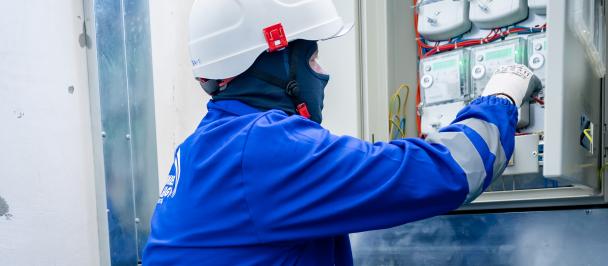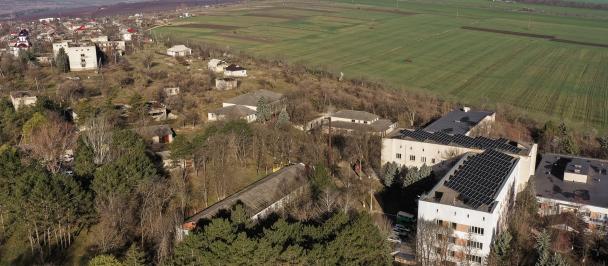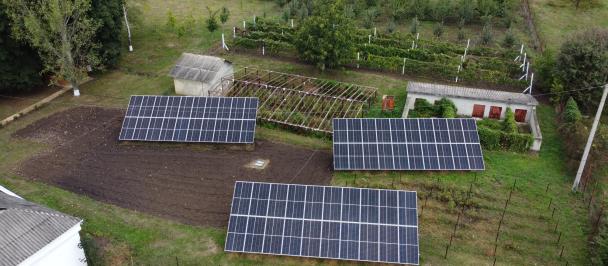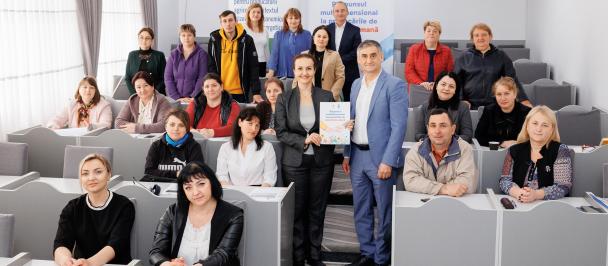The EU4Climate project, funded by the European Union and implemented by UNDP, will assist the Republic of Moldova in drafting the relevant legislation to transpose the climate acquis. The Republic of Moldova has committed to transpose several European climate directives, when signing the Association Agreement with the EU in 2014 and by acceding to the Energy Community Treaty in 2010.
The experts contracted by EU4Climate and the Secretariat of the Energy Community have developed a set of recommendations on the harmonization of legislation and the action plan for it. These proposals were presented on 27 May 2020 at a videoconference. The immediate priority is the transposition into national legislation of the EU Regulation on fluorinated gases, also known as F-Gases, used among others in coolers and refrigerators. As substitutes for ozone-depleting substances, F-gases do not affect the ozone layer and are more energy efficient but have a very high global warming potential. Once emitted, they can remain in the atmosphere for thousands of years.
Another priority is the transposition of the directives on the European Greenhouse Gas Emissions Trading Scheme (EU ETS) and the ozone-depleting substances.The deadline for transposition of EU ETS legislation is 2022. In the EU, the system was launched in 2005 and sets emission limits for factories, power plants or other installations. Companies can sell emission “savings” or, conversely, buy additional rights to emit greenhouse gases from other companies. If the permissible emission limit is exceeded, companies are penalized. Before proceeding with the transposition of this Directive, experts recommend conducting a study on the feasibility of the EU ETS in the Republic of Moldova, in order to be sure that the benefits outweigh the costs of implementation and maintenance. From the 16 provisions of 2003/87/EC Directive needed for the implementation of this recommendation, only two provisions (Annex I and Annex II) were transposed into national legislation until today. The Energy Community Secretariat is also supporting this work by conducting a study on carbon pricing design in the Energy Community. Recommendations of this study will be made accessible later this year.
"The full transposition of the acquis communautaire into national law will facilitate the achievement of the objectives of the Nationally Determined Contribution in the Paris Agreement on the Reduction of Greenhouse Gas Emissions. The Republic of Moldova is committed to reduce the GHG emissions up to 70% by 2030 compared to 1990," said the State Secretary within the Ministry of Agriculture, Regional Development and Environment, Maxim Popov.
Peter Michalko, EU Ambassador to the Republic of Moldova, mentioned: “The EU is a frontrunner in fighting climate change and greening the economy. With the European Green Deal, the EU has raised even more its ambitions and will deliver the highest standards to its citizens while respecting and protecting the environment. I am certainly proud to note that the Republic of Moldova is steadily following the EU example, which reinforces the already sound partnership of the Association Agreement. Transposing EU legislation into the Moldovan system is opening new perspectives and opportunities; most importantly, it is already improving the citizens’ quality of life. The unfortunate COVID19 crisis has disrupted the world economy and a greener and more sustainable economic model seems much needed now. The Republic of Moldova, with EU support, is preparing to accelerate on the low carbon and climate resilient development. That is very timely and certainly will help overcoming the crisis and allow the economy to thrive. Protecting the environment and fighting climate change is a global task, which proved to be challenging. I am convinced that together we are stronger, and we will succeed!”
A National Energy and Climate Plan should be developed. The aim of this plan is to integrate the different energy and climate planning processes of the country into one document in order to deliver a coordinated approach towards low-carbon development. It is to be submitted to the Energy Community Secretariat in October 2020, following national, regional and international consultations.
The Director of the Energy Community Secretariat Janez Kopač said: “It is paramount that Moldova stays on course in spite of the ongoing COVID-19 crises. The Roadmap unveiled today will guide Moldova in upgrading its climate and energy policies first and foremost for the benefit of its citizens. As the Energy Community Secretariat, we are fully committed to supporting Moldova in these endeavors, especially in the context of the development of its 10-year National Energy and Climate Plan. In this respect, we would also like to express our appreciation to Moldova for submitting its updated Nationally Determined Contribution as the first Energy Community Contracting Party and as the fourth country on the globe to do so! The different climate and energy planning processes when properly aligned will be able to steer the low-carbon energy transition.”
“With the COVID 19 pandemic gripping the globe, climate change remains a threat and addressing its impact is even more of a priority. 2020 has been declared as the Year of Climate Action, a year when we can still make a difference. UNDP is proudly partnering with the EU, including on the EU Energy Treaty, to support Moldova in assessing the EU climate acquis gaps vs. commitments and offering a roadmap to advance climate policy and legal framework,” said Dima Al-Khatib, UNDP Resident Representative for the Republic of Moldova.
***
With a total budget of 8.8 million Euros, the EU4Climate Project is implemented during 2019-2022 and has the following components: (i) updating the Nationally Determined Contributions to the Paris Agreement; (ii) developing National Low-emission Development Strategies by 2050; (iii) the introduction and strengthening of the framework for the monitoring, reporting and verification of greenhouse gas emissions; (iv) alignment with the acquis communautaire in the field of climate; (v) integrating the climate dimension into sectoral policy documents, raising awareness and developing sectoral guidelines for the implementation of the Paris Agreement; (vi) attracting investment in climate change; (vii) better planning for adaptation to climate change.

 Locations
Locations




